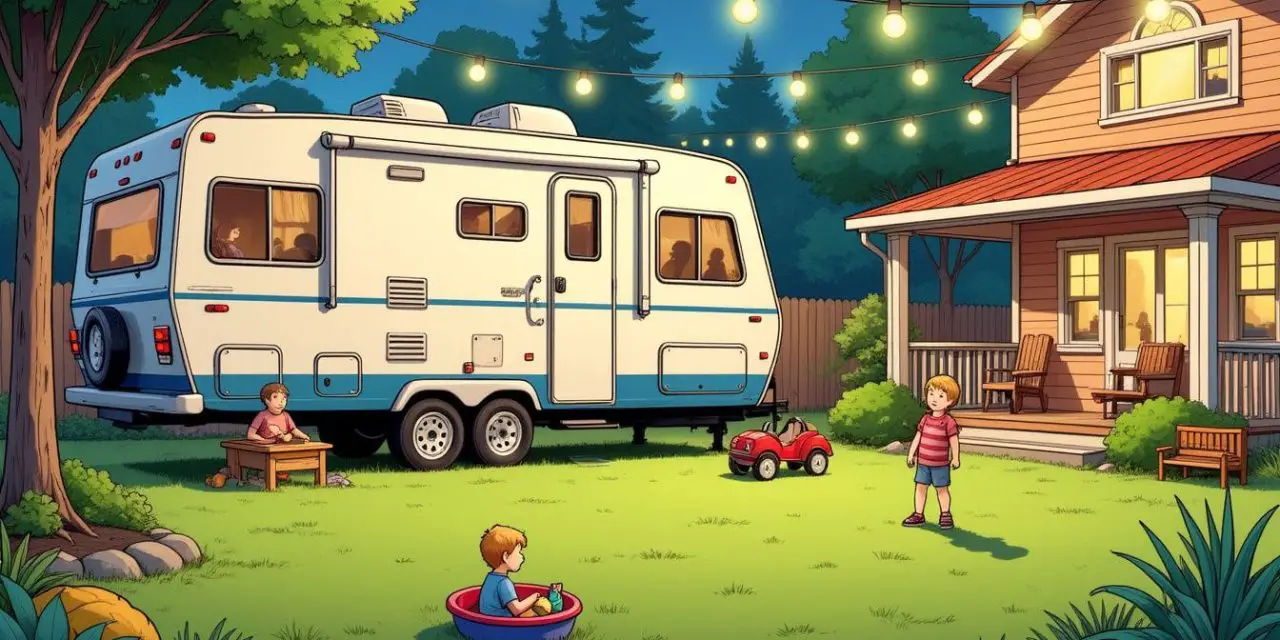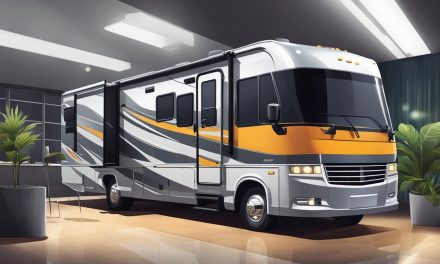Would you like to save this article?
Thinking about parking an RV on your property? You’re not alone—many people wonder, “can I have an RV on my property?” The answer depends on local zoning laws and building codes.
This guide breaks down the rules of several states, so you know exactly what’s allowed. Keep reading to find out if your dream setup is possible.
Understanding RV Regulations on Private Property
Local zoning laws decide if you can park an RV on your land. Building codes and permits often affect how long it can stay or if utility hookups are allowed.
Check with county offices—rules vary for full-time living, temporary guests, or storage. Some areas ban RVs as permanent homes but allow short-term use.
Zoning Laws and Restrictions
Zoning laws decide if you can park or live in an RV on private property. These rules vary by city and county, often restricting RVs to certain zones like agricultural or recreational land.
For example, California bans using an RV as a primary residence due to strict local zoning ordinances.
Zoning laws aren’t just red tape—they shape where and how we live.
Property classified as residential may forbid full-time RV living, while some states allow it with permits. In Washington, you can stay up to 180 days a year with approval. HOAs add another layer of rules, sometimes banning RVs outright.
Always check local codes before parking.
Building Codes and Permits
Local building codes and permits play a big role in RV living on private property. Cities often require inspections to ensure RVs meet health and safety standards for long-term stays.
Things like sanitation, electricity, water, and sewage connections must pass these checks.
Permits may be needed if you plan to hook up utilities or stay longer than allowed—some areas limit habitation to 30 days without approval. In Nebraska, living in an RV beyond 30 days requires a Camper Unit Permit, which expires January 1 each year.
Always check with your local building department for specific rules about rv permits and zoning laws before parking permanently.
RV Living on Personal Property
Want to live in an RV on your land? Check if local laws allow it—rules vary for temporary stays versus full-time living. You’ll need hookups for water, sewer, and power to make it work properly.
Temporary vs. Permanent Residence
Living in an RV on your property falls into two categories—temporary or permanent. Many states, like California, allow short-term RV stays but prohibit using them as a primary residence unless they meet specific building codes.
Temporary setups often include guest stays or transitional housing during renovations, while long-term stays may violate zoning laws if the RV lacks proper utility connections.
Some cities enforce seasonal restrictions, especially in wildfire-prone areas, limiting year-round residency. BLM land permits boondocking for 14 days before requiring a 25-mile move.
HOAs and local covenants can also block RVs from being parked long-term. To avoid legal complications, check local rules on travel trailers and motorhomes before making plans.
Planning ahead is key to RV living—know the rules first.
Utility Connections and Requirements
Setting up an RV on your property means dealing with utility connections—and they must follow local codes. Long-term living requires proper water, sewer, and electrical setups to meet safety standards.
- Water access needs a direct hookup to a clean supply or an approved portable tank system. Some areas require backflow prevention devices to avoid contamination.
- Sewer connections must link to a septic system or municipal sewer line. California’s health codes demand leak-proof waste disposal to prevent environmental hazards.
- Electricity requires a dedicated power source, often a 30- or 50-amp outlet. Inspections ensure wiring meets fire safety standards before granting permits.
- Self-contained RVs can skip direct hookups—if they have onboard water tanks and waste systems. Temporary stays often allow this setup without permits.
- Permits are mandatory for permanent utility installations. Local officials may check connections yearly to confirm compliance with building codes.
Now, let’s explore how different states handle RV living on private property.
State-Specific RV Regulations
Rules for RVs vary by state—California has strict zoning laws, while Florida offers more flexibility. Check local codes for parking, sewage, and power hookups before setting up on your land.
California
California has strict RV living rules that vary by city. In San Diego, overnight parking is limited to designated RV parks and campgrounds—living in an RV on private property isn’t allowed.
Gardena bans street parking for RVs between 10:00 p.m. and 6:00 a.m., unless you have a permit or your vehicle breaks down.
Zoning laws can make or break your RV lifestyle—know the rules before you park.
Some cities, like San Jose, prohibit RVs within 150 feet of schools and ban living in them on personal property entirely. On Bureau of Land Management (BLM) land, boondocking is limited to 14 days per spot before moving at least 25 miles away.
Planning ahead helps avoid fines or eviction from safe parking lots.
Florida
Florida allows full-time RV living on private property, but local zoning laws and permits apply. Many areas offer RV parks with annual leases—some even include amenities like water, power, and sewage hookups for year-round stays.
To live in an RV legally, you’ll need to meet utility connection rules set by local ordinances.
Some places restrict permanent RV use in hazard-prone zones or under specific building codes. Unlike mobile home parks, Florida’s RV communities often have shorter stay limits unless special permits are secured.
Always check homeowner association (HOA) restrictions before parking your fifth wheel or camper onsite.
North Carolina
North Carolina allows full-time RV living on private property if you follow local rules. Zoning laws vary by county, so check with local authorities about permits and inspections before setting up.
Some areas may need utility hookups for water, sewer, or electricity to meet long-term occupancy standards.
Parking an RV at home in North Carolina works best when zoning laws align with your plans. Campsites or rural spots often have fewer restrictions compared to urban areas. Always confirm homeowners’ association (HOA) rules—some ban RVs entirely while others allow temporary stays for guests or rentals.
Additional Factors to Consider
Homeowners associations may impose extra rules beyond zoning laws—check local HOA guidelines first. Property size impacts parking options, while accessibility affects utility hookups and mobility.
Homeowners Association (HOA) Rules
HOAs often have strict rules about RVs—sometimes tighter than local zoning laws—that limit parking; storage; even living full-time; check your bylaws first before making plans
*“An ounce prevention worth pound cure” applies here*
Many associations ban long-term stays outright while others demand advance notice if guests bring campers temporarily—violations risk fines plus forced removal so always verify policies ahead
Property Size and Location
Beyond HOA rules, property size and location play a big role in RV placement. Rural or agricultural land usually allows more flexibility for RV living compared to urban lots. Local zoning laws often set minimum lot sizes and setback distances, so check these first.
Flood zones and hazard-prone areas may ban RVs entirely or restrict seasonal use. Properties near schools—like those in San Jose—might have extra rules, like no parking within 150 feet.
Access to utilities like water and electricity also depends on infrastructure, which varies by location. Larger lots with easy road access simplify RV living.
Parking and Accessibility
Parking an RV on your property depends on local rules and space. Many cities ban overnight RV parking on public streets—Gardena, CA prohibits it from 10 p.m. to 6 a.m. without a permit.
Driveway parking is usually allowed for short stays, like hosting guests or during home repairs, but long-term living often violates zoning laws.
Accessibility matters too. Retail lots like Walmart or Cabela’s may allow overnight stops if approved by management and local laws. For more flexibility, national forests and BLM lands offer dispersed camping for up to 14 days—just move 25 miles afterward to comply with rules.
Check property size, HOA restrictions, and utility hookups before parking your rig full-time.
Benefits of Having an RV on Your Property
An RV on your property offers low-cost housing, extra space for guests—or even rental income—and a backup shelter in emergencies.
(Keep reading to see how an RV could work for you.)
Affordable Living Option
Living full-time—or even part-time—in an RV cuts housing costs dramatically compared renting apartments like those found around Austin city limits where prices keep climbing higher every year! Monthly payments drop sharply since most people own their rig outright after financing ends plus yearly membership programs such as Thousand Trails slash campground fees down under $700 annually including utilities hookups at participating parks throughout states like sunny Florida.
Insurance savings stack up fast too because bundled policies covering both tow vehicles *and* attached trailers frequently cost less than standard homeowners’ plans would charge separately elsewhere across regions zoned residential versus commercial districts near bustling hubs such as San Antonio outskirts dotted among quiet rural roads perfect parking spots without breaking local ordinances either way…
Flexibility for Guests or Rentals
Having an RV on your property offers a flexible space for guests or short-term rentals. Many regions allow temporary RV stays, perfect for visiting relatives or holiday gatherings.
Local laws often permit RV rentals for extra income, but HOA rules may restrict this.
RVs can serve as a guesthouse, office, or studio without major home renovations. Some areas limit long-term RV living, so check zoning laws and permits first. Utility connections must meet local codes to ensure safe, legal occupancy.
Emergency Preparedness
An RV on your property can be a lifesaver during disasters. Its onboard water, propane, and generators let you live off-grid during power outages or wildfires. Some areas even waive residency rules for short-term emergency use—like after floods or storms.
RVs also offer quick evacuation before severe weather hits. They’re ideal for temporary housing if your home needs repairs. Just check local zoning laws first—some places restrict long-term RV living but allow it for emergencies.
Campgrounds and RV resorts might have tighter rules than private property.
Challenges of RV Living on Private Property
Living in an RV on your property isn’t always smooth—zoning laws and local codes can create unexpected hurdles. Security risks, harsh weather, and limited utility hookups may also turn your dream setup into a headache.
Zoning Compliance Issues
Zoning laws often create headaches for RV owners wanting to park on private property. Many areas restrict long-term RV living, treating it as a temporary use—California enforces this strictly, allowing only short stays in most zones.
Violations can lead to fines or forced removal of the vehicle, making compliance a must.
Local rules may ban connecting RVs to utilities like water or sewer lines, limiting their use as full-time homes. Some states—including Delaware and Nevada—outright prohibit living in an RV on residential land year-round.
Others impose frequent relocation requirements—like moving every 14 days on BLM land. Homeowners’ associations (HOAs) add another layer of restrictions, often banning RV parking entirely regardless of zoning laws.
Always check local codes before settling your Winnebago at home for good.
Weather and Security Concerns
Keeping an RV on your property comes with weather risks. RVs face more damage from wind, hail, and floods than regular homes. Wildfires, heavy snow, or extreme heat can make year-round RV living unsafe—even impossible in some areas.
Local rules might force you to evacuate during emergencies too.
Security is another issue—RVs aren’t as tough as houses. Their lightweight construction makes them easier targets for theft or vandalism. Insurance costs can spike if you live in places prone to storms or wildfires.
Some RV campgrounds and rest areas have better safety measures… but on private land? That’s up to you to handle locks, alarms, and proper parking setup near utility connections.
Conclusion
The answer depends on local laws and zoning rules. Check with your city or county for specific regulations. Proper permits and utility setups may be required. Whether it’s for temporary stays or full-time living, knowing the rules ensures a smooth experience.
Always verify before parking your RV at home.





